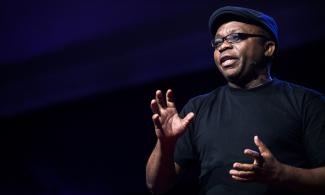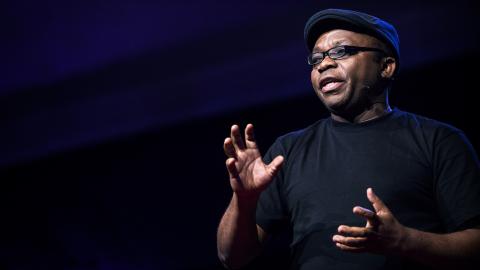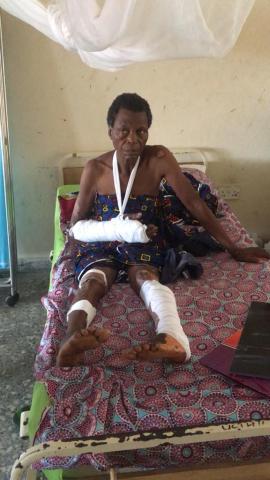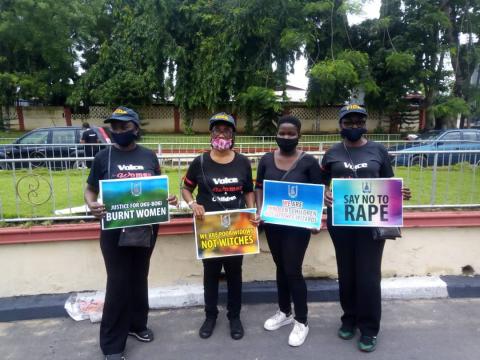
Now as long as this pattern of impunity, lack of access to justice, state apathy and a dearth of empathy continues, witch persecution and other forms of gender-based violence in Nigeria would not stop.
There has been a nationwide protest against gender-based violence in Nigeria. This protest has been used to raise awareness about rape, and to mobilize all sections of the society against sexual and gender-based abuses.
Protests have been held at state capitals-in Calabar, Ibadan, Jos, and Umuahia. While these demonstrations have overwhelmingly emphasized rape and domestic violence, and understandably so, due to reported cases across the country, violence that people perpetrate against women who are alleged to be witches has largely been ignored. In fact it was only in Calabar that the protest has so far visibly included the topic of witch persecution. Some of the participants carried placards with inscriptions: “JUSTICE FOR OKU-BOKI BURNT WOMEN”; WE ARE POOR WIDOWS, NOT WITCHES”; “WE ARE INNOCENT CHILDREN NOT WITCHES AND WIZARDS”. The inclusion of the topic of witchcraft in the protests in Cross River may not surprise anyone given the recent case of witch-hunting in the state. In May, a lynch mob led by an aide to the state governor set ablaze over 14 persons who have been suspected of witchcraft in Boki in central Cross River.

One of the victims of the incident, Delia, has been transferred to a specialist hospital where she is battling for her life. According to a local source, on that fateful day, Delia returned from her farm at about 5 pm. She was sitting outside her house when some thugs wielding machetes and sticks arrived her compound. They told her: “We have come for you”. She replied, “For what? What have I done? They commanded her to follow them. She was holding her rosary. They threw the rosary away and started dragging her. They hit her on the right hand and broke the arm. The thugs also hit her on the head and at the back. They dragged her to the place where they had set up some fire. The thugs collected her wrapper and threw her into the fire. The fire burnt her bottom, the two hands, and at some point, she became unconscious and collapsed. Fortunately she did not die but had serious burns. Some relatives later came and took her to a nearby hospital.
This form of gender-based violence is not peculiar to Cross River or Akwa Ibom. Witch persecution is a nationwide disease and is highly gendered. Although males are accused and persecuted as wizards, witchcraft has a female face. Women are predominantly accused, attacked, or killed as witches. Females are usually scapegoated as perpetrators of occult harm. Thus the topic of violence against women who are alleged to be witches should be integrated into the ongoing protest against gender-based violence nationwide. Unfortunately, that has not been the case. Witch persecution has not been sufficiently integrated and highlighted in the ongoing campaign against sexual and gender based violence nationwide.
Surely anyone who understands the religious climate in Nigeria would not be surprised at the reluctance or lack of interest in highlighting violence linked to witchcraft belief at these protests and demonstrations. Belief in witchcraft is widespread in the country. Christianity and Islam have reinforced the notion that people could harm others through occult means. Thus many Nigerians do not want to campaign against violence linked witchcraft accusations and persecution because they still believe that witches exist and could harm them or others. Many Nigerians are not keen about highlighting this category of gender-based violence because they do not want to be seen to be supporting harmful activities of 'witches'.
But this orientation must change. Nigerians need to abandon this superstitious belief that human beings could harm others through magical means. Nigerians need to get rid of their occult fears and anxieties. If this form of gender-based violence must stop, a critical mass of Nigerians must become advocates against witch persecution. A significant number of Nigerians must become critical thinkers, skeptics and rationalists. As in the case of the protest in Calabar, campaigns against gender-based violence must feature inscriptions that categorically disapprove and denounce violence linked to witchcraft belief. Protesters across the nation should mainstream advocacy against the persecution of women and girls who are accused of witchcraft.
Part of the reason why witch persecution persists is because witch hunters know that they would get away with their crimes and atrocities. They know that nobody would hold them to account. Nobody would bring them to justice. For instance, the aide to the governor and others who assaulted and lynched alleged witches in Boki have not been arrested. There has not been any move by the state government to support and compensate victims of this mindless violence. Is that how we are going to end sexual and gender-based violence in Nigeria? No. Look, if pressure is not brought to bear on the state government and police authorities, Thomas Obi Tawo and other suspected perpetrators of these heinous crimes will not be held responsible or accountable. They would go scot-free. This has always been the pattern when it comes to witch persecution and other forms of sexual and domestic violence. The suspects are not arrested and if they are arrested, they are later released without charge. The victims are not compensated. They are usually advised against taking their cases to the police or seeking redress in courts because nothing would come out of these processes.
Victims are made to resign to their fate and to quietly leak their wounds. Victims of witch hunts and other forms of sexual and gender-based violence fear that they could suffer worse consequences if they tried to seek justice. There is institutional indifference and conspiracy against victims of gender based violence. The government does not care for the victims. The police do not case. In fact, as in most cases that are reported to the police, officers are usually more interested making money from cases of gender-based violence that are reported to them. They demand bribe or mobilization fees from victims and their families before they could make arrests or conduct investigations. So to avoid suffering further abuse and exploitation, victims of sexual and gender-based violence usually do not take their complaints to the police. They hand the matter over to God!
Now as long as this pattern of impunity, lack of access to justice, state apathy and a dearth of empathy continues, witch persecution and other forms of gender-based violence in Nigeria would not stop.
Protests or no protests.
..the daughter and younger

